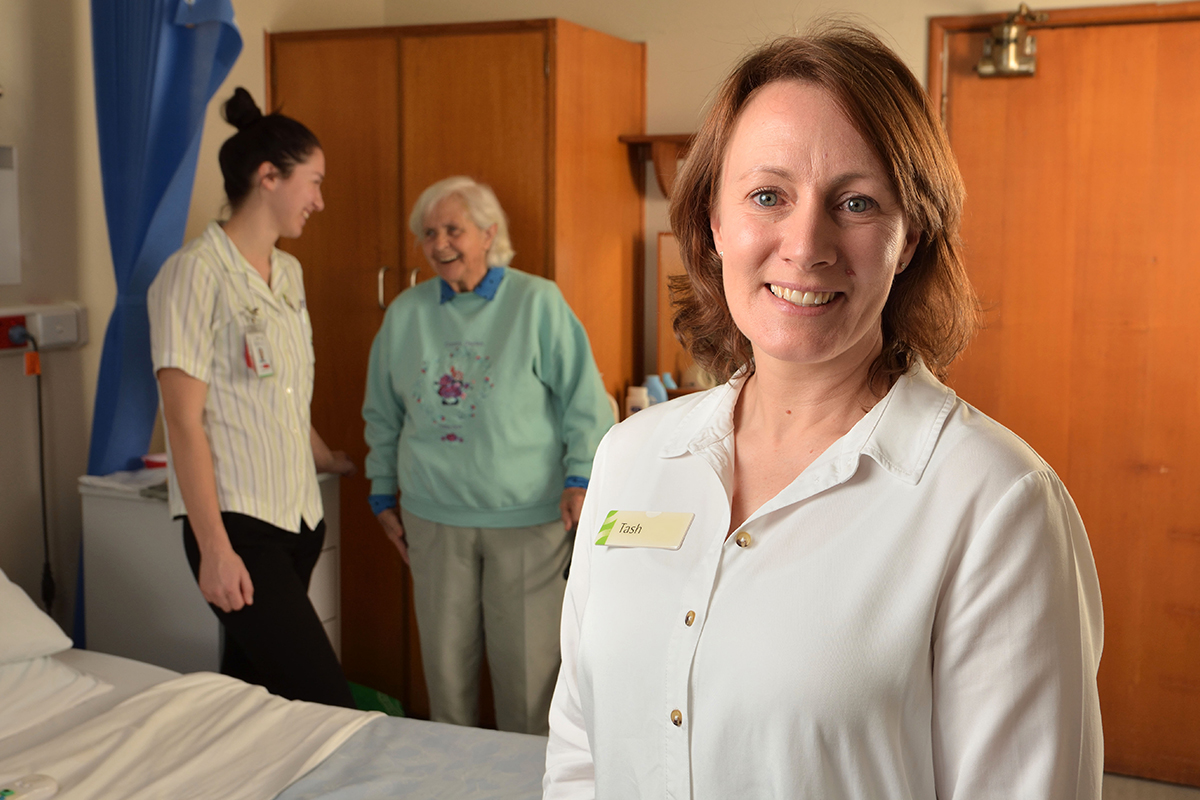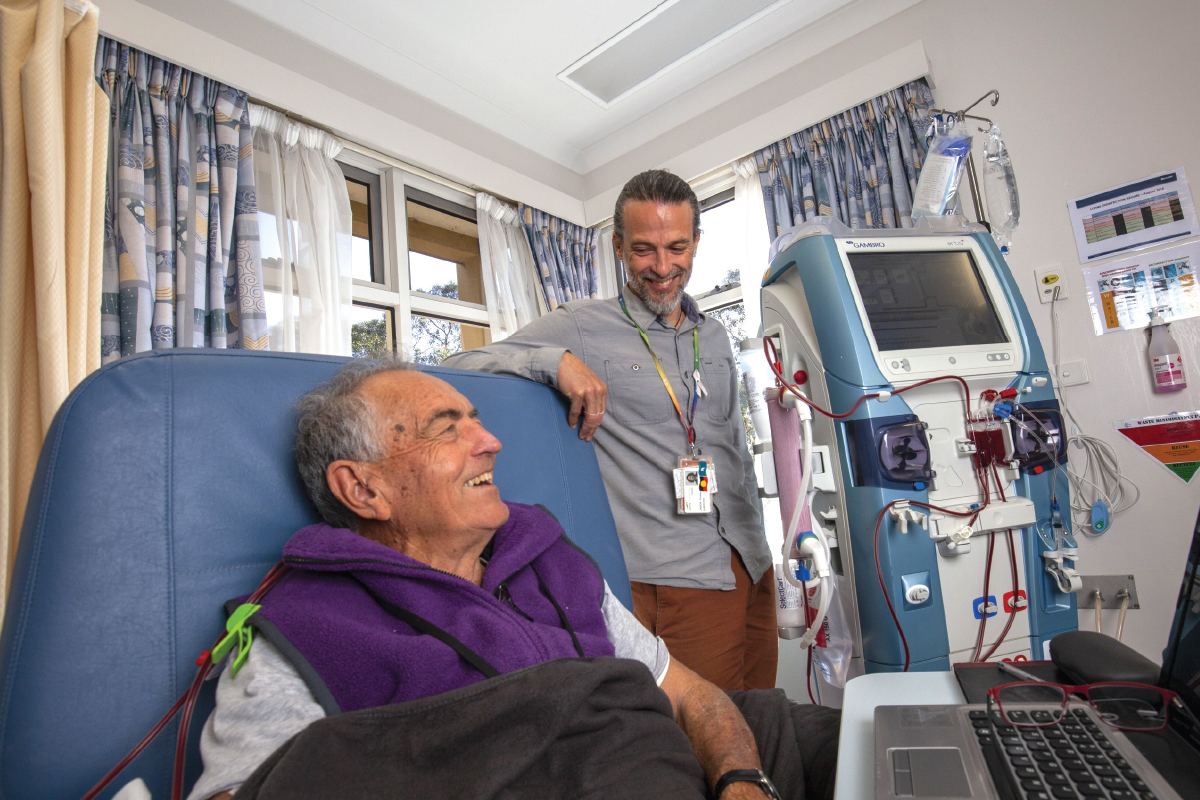
Camperdown Hospital NUM Tash Swayn. Photo: Robin Sharrock.
Tash Swayn didn’t want to be the nurse unit manager at Camperdown Hospital when her colleague resigned five years ago. Her regular night duty suited the Swayn family just fine.
But when the NUM in charge of the acute ward returned to his home town of Warrnambool, everyone seemed to be looking at Tash. ‘They just couldn’t get anyone to do it,’ she says. ‘I’d been a bit frustrated, because I am incredibly invested in the town and I wanted things at the hospital here to be progressive. But at the time, we were dying a bit.’
‘We were doing a day of theatre probably every two weeks, our patient throughput was very minimal, and I just thought “Uh, someone has to love this or we’re going to end up without a hospital or the whole hospital will end up being an aged-care facility’’.’
Far from reducing to a single-purpose facility, Camperdown Hospital in the past few years has been revitalised and strengthened under Tash, with the support of South West Healthcare executives, Warrnambool campus managers, colleagues, the town’s people and medical counterparts in regional health services.
NUMs such as Tash lead the nursing team in rural and regional areas. They are responsible for rosters and budgets, and recruiting and retaining nurses and midwives. They are mentors for their nursing and midwifery teams, helping to encourage and guide them with further education, or excite them about career pathways.
Being a NUM in a regional or rural area involves a surprisingly wide-ranging array of skills: clinical, administrative and social. It requires an ability to network effectively, patiently and professionally at all levels of the health system and across the region.
Usually, they are the most senior staff member at hospitals where doctors might be on call or not in the near vicinity at all. In regional towns, the NUM is the go-to person.
Daunted? Not Tash Swayn. ‘I pretty much learnt on the job,’ she says. ‘Initially, I was just really focused on getting the ward running well.’
You hear the word ‘investment’ a lot when talking with Tash.
This whole town, her growing-up place, nestled among the plains, lakes and ancient volcanoes of Victoria’s western district, is committed to ensuring the hospital works efficiently and effectively for everyone who needs care.
‘You underestimate how invested people are in the hospital,’ she says. ‘If I send out an SOS and say, “I’ve got someone really sick and I need help”, ten people would text me back and say, “I’ll be in!”. If you need any equipment and you said, “You know, we need to raise money”, it just comes. Because the people, they know how valuable the hospital is to the town.’
‘I’m insanely passionate about it and I think people feed on that. If you’re passionate, they will come on the journey with you, mostly not kicking and screaming.’
Tash boosted her skills after she took on the NUM role. She did the RIPERN (remote and isolated practice endorsed registered nurse) course to extend her scope of practice, and she strongly encourages colleagues to do the same. RIPERNs can administer and supply certain medications without an order from a doctor.
She also organises education courses on resuscitation and emergency care, to ensure Camperdown’s nurses are abreast of best practice skills and knowledge when it comes to basic life support in the community setting.
‘In a small town, you are a specialist-generalist,’ she says. ‘You’re good at everything, but you’re not an expert in anything,’ Tash says.
One hundred kilometres away on the surf coast, Jason Phieler is the NUM in charge of acute services at Lorne Community Hospital.
His remarkably varied career has included several years living in India and Nepal, infectious diseases and emergency department work, and working through the transformation of the hospital over the past 17 years.
‘Oh my god, has it changed!’ Jason says. ‘The whole system has changed. Lorne Community Hospital was a typical rural hospital where you had your two dedicated rural GPs on call seven days a week. It was isolated in terms of clinical practice to a certain degree, and there was that system of nurses being “handmaiden” to the doctor.’
Jason, with the support of his colleagues, took on the NUM role about six years ago. He splits his workload 50-50 between administrative and clinical work, oversees the recruitment and retention of staff, and encourages them to get the best possible education and career options, including RIPERN, to pursue their goals.
He runs a robust internal staff education program based around typical seasonal emergencies such as hypothermia and snake bites. And once every month, an emergency consultant visits from Geelong to give staff a refresher course, updates or specific training.
Staffing in a seaside town is a major issue every summer. In Lorne, the population swells from 1000 locals – mostly elderly retirees – to tens of thousands of often highly-adventurous holidaymakers and tourists. But because the hospital’s budget does not expand to cover peak staffing requirements, the pressure is on Jason to keep costs in check the rest of the year.
Extending nurses’ scope of practice in rural areas a ‘no-brainer’

Lorne Community Hospital NUM Jason Phieler and patient Michael. Photo: Michael Chambers.
Like Tash Swayn, Jason is a RIPERN. Indeed, he has taught the course under licence in Victoria and is keen to see the program expanded to address need in rural areas.
It’s a ‘no-brainer’ to use nurses in an extended scope of practice in rural Victoria but the public’s perception of a nursing role also needs to expand, Jason says.
‘Because the fact is, we’ve got major issues of workforce [deficiency] in rural Victoria. The reason the state government went after a system like this was to help take the pressure off those GPs that we do have in our rural communities.’
Beyond providing safe and effective care in the absence of doctors, the additional skills RIPERN nurses learn increase job satisfaction ‘which adds to retention, which then helps us with recruitment,’ Jason says.
In 2008-09, Jason and another Lorne Community Hospital nurse did the Rural and Remote Radiography certificate course at University of South Australia and became qualified operators of X-ray machines. As a result, their hospital became the first nurse-led remote radiology service in the state.
X-rays taken by the Lorne nurses are assessed remotely by Barwon Medical Imaging in Geelong and used in determining who needs urgent transfer to a bigger hospital. Jason cited a recent case when a man had a severe fracture, but with splinting and pain treatment he was able to be transferred to Geelong by car – freeing up the sole local ambulance, which was almost immediately needed at a major car accident.
Tash Swayn notes that 20 years ago, Camperdown Hospital and its single operating theatre handled acute cases, including major trauma after car accidents on the rural highways.
Today, the hospital still covers the gamut of medical cases, but it transfers out serious or problematic cases, including paediatric cases that can be more effectively managed in big-city, specialist units. While Lorne does not handle midwifery cases, except in emergency situations, Camperdown Hospital delivers about 30-40 babies a year.
Breadth and depth of work
‘We do a huge variety of stuff,’ Tash says. ‘General medical patients, surgery, palliative, midwifery. We operate here about seven to eight days a fortnight. We do a lot of endoscopy-type surgery, so colonoscopies and gastroscopies, and we do orthopaedics, ENT [ear, nose and throat], gynaecological, urology, basic plastic surgery such as hand surgery, large lesions and that sort of thing.
‘If you walked into Camperdown hospital with a heart attack, we can get you into a helicopter in probably 30 to 40 minutes, and you’d be in the catheter lab in Geelong about 25 minutes after that,’ she says. ‘We are just really good at it now. We’ve changed out systems and we’ve worked really hard to have good processes.’
The transition for some nurses working in a regional area for the first time can be difficult, even overwhelming, Tash says, especially if they are not accustomed to the breadth and depth of work.
A regular day could involve simple suturing or splinting, to cardiac arrests and strokes; from dealing with the aftermath of road accidents to aged care concerns and more.
‘It can be a real shock for them,’ Tash says. ‘Because they realise while they had very technical skills in a cardiac unit in Melbourne or wherever, they were very specialised in that. They go, “Oh my god,
I haven’t done an abdo pain, or I haven’t looked at kidney stones, or I haven’t assessed a head injury for 10 years”.
‘So, it can be really challenging for the younger staff if I say to them, “Have a go at being in charge while I am here”. But out of hours is an entirely different scenario, because you might have only three staff on at night and if someone arrests you’ve literally won or lost it by the time the doctor gets here. We do so much practice of that sort of stuff so that everyone is skilled.’
Many nurses in regional areas take study leave in bigger cities to extend their skills, for surgery or theatre practice, midwifery, critical care and more. Part of the NUM role, Tash says, is to encourage and support them, in the hope that they will return to the town.
For Tash, the bittersweet part of working in a small regional area is palliative care.
‘For me, it’s an honour to be able to care for people and their families at that time, and I love it. I consider myself fairly strong, but the only time I would go home from work in tears is after a palliative care patient has died, someone we’ve cared for over a long time and whose family you know. Those for me are probably the ones that have a lasting effect.
‘We’ve had a lot of people who have come into emergency, and we’ve patched up and shipped out and you hope they’re going to make it. But it’s the ones who are here for weeks that really affect you. And I know it sounds ridiculous, but five years ago when we had so many deaths I said to my husband, “I just don’t want to go to the supermarket, I can’t look at them”. Every time I go to the supermarket, there’s someone whose family member died and for me that has been the most taxing thing over the years.’
As for professional isolation, which can be a difficulty for very remote or rural healthcare professionals, neither Tash nor Jason allow themselves to drift out of touch.
‘We can sometimes feel professionally isolated, but I sometimes think we do it to ourselves by not embracing the things that are out there,’ Tash says.
‘The best thing are the people who walk in that you resuscitate, and you send them out by helicopter, and they come back in a couple of weeks later to thank you,’ she says. ‘That’s pretty special.
And then you see them at the footy club and they’re telling everyone how – not that I personally saved them, it’s always a team – but just someone who came in and was basically deceased when they got here, you’ve managed to get them back and they walk in a few weeks later and say hello.
‘And my biggest celebration is when those teams arrive from Melbourne (NETS – the neo-natal emergency transfer service, PIPER or ARV) and they say “Wow, you guys have done a great job, there’s nothing else for us to do here, we’ll just get going”. That for me is the fist-pump moment. I can say, “Yes! We did that so well”.’




